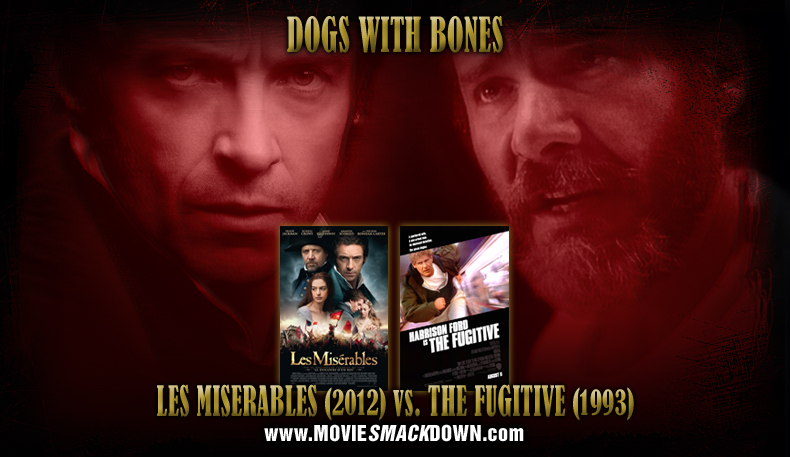
 The Smackdown
The Smackdown
Yes, I know, we could have put this operatic soon-to-be blockbuster, Les Miserables, up against any number of period musicals translated to movies, from The King and I to Sound of Music to Moulin Rouge. Or we could have matched it against any of the multitudinous other film adaptations of the Victor Hugo novel or even against the stage musical itself. Someone else with more academic credentials or film school training than we have can dissect those comparisons at another time. (If you can’t wait, there’s always Wikipedia.)
The thing is, as I watched and listened to the sincere musical emoting of the modern Les Miserables at a pre-release screening at the Pacific Design Center theater here in Hollywood, my mind kept trying to focus on the actual story. Namely, the convict Jean Valjean’s flight from the relentless Inspector Javert, who just won’t cut him a break, no matter how many good deeds he’s done or may still do if allowed his freedom. Kind of like that Sam Gerard federal marshal chasing Dr. Richard Kimble in The Fugitive. What is it with these hard-ass law enforcement guys? Dogs with bones, if you ask me. Sure, they’re tough as nails against overmatched perps, but how do they stack up against each other? Sometimes, all you need is a good Smackdown to find out.
 The Challenger
The Challenger
Victor Hugo got the Les Miz train started with his 1862 novel about Inspector Javert’s Ahab-like obsession with capturing escaped convict Jean Valjean. It’s a whopper of a novel, with hundreds of characters whose French names give English-speakers fits. It’s been made into a film or TV movie around the globe probably dozens of times, most notably the Best Picture nominee from 1935 with Frederic March and Charles Laughton, and most recently as a feature film in 1998, with Liam Neeson and Geoffrey Rush.
The novel has as many subplots as nineteenth-century Paris had underground tunnels, but the essence is that an ex-con tries to become a force of good in the world but can’t escape his past because a ruthless policeman won’t let him. During his journey, readers and viewers bump into unrequited love, passion, sacrifice, broken dreams and, not-so-shockingly, the survival of the human spirit. Les Miserables has always been associated with size and endurance, as well as depth. The novel is considered one of the longest ever written and has a single sentence that goes 823 words. As a theater experience, it is the world’s longest-running musical. 
The Defending Champion
I’d feel bad for people who never enjoyed the TV series The Fugitive in real time, except for that fact that they have youth on their side which changes everything. It was a great marriage of premise and talent. David Janssen starred as Dr. Richard Kimble, a doctor falsely convicted of his wife’s murder who, on the way to death row, escapes from a train crash and sets out to find the “one-armed man†he is sure is the real killer. He is pursued throughout his quest — about four seasons’ worth — by the implacable Lieutenant Gerard, played by Barry Morse. The movie people were smart enough not to fool with the basics and instead spent their time amping up the production value (the train wreck now involves a bus and is the best ever), and adding twists and turns and some great casting.
Kimble is played by Harrison Ford at his smart, cunning, motivated best, and Gerard’s role goes to Tommy Lee Jones. It’s  a role he seemed born to play, and one that eventually rewarded him with a Best Supporting Actor Oscar. As in the TV series, Kimble has to keep from being captured long enough to hunt down the professional criminal he thinks actually did kill his wife – a one-armed man. Meanwhile, Gerard puts together a task force to hunt him down, even if he has to search “every whorehouse, doghouse, and outhouse” to bring Kimble to justice.
The Scorecard
Both Les Miserables (2012) and The Fugitive (1993) take their inspiration from earlier works. Although Les Miz has a more highfalutin lineage, The Fugitive owes its snap and sizzle (and focus) to its TV series roots. Both share the same high concept of innocent man pursued by dogged cop. And while both include plenty of other sidebar stories, the central conceit is more front and center in TF.
The difference in the scope of the crimes that have allegedly been committed is striking. Jean Valjean is accused of stealing bread to feed his family, and then stealing silver from a monastery, and he’s guilty of both. Richard Kimble is accused of murdering his wife in a jealous rage, and he never did. This changes the stakes dramatically. In Les Miz, Valjean isn’t out to prove anything; he just wants to be left alone to lead his reformed life of good deeds. Kimble, on the other hand, desperately needs to prove that the law has the wrong guy in its cross-hairs. In that sense, it is deeply, tragically personal.
For me, though, it’s the motivation of the pursuers that makes both these stories come alive. Inspector Javert, despite all those pages and iterations, still seems to be just petty as all hell. His prey served nineteen years for stealing bread, and now he’s doing the right thing. Aren’t there enough problems in post-Napoleonic France to let it go and devote his life to real problems? Apparently not. Lieutenant Gerard has a more realistic sense of duty. It may very well be that Kimble did not kill his wife, but the law is the law, and the law says he did. At a climactic moment, when a cornered Kimble screams, “I didn’t kill my wife,” Gerard shrugs, “I don’t care.”
Les Miz is so full of diversions that the central story feels undeveloped, but The Fugitive is focused like a laser on its cat-and-mouse pursuit. Of course, some will say that being a musical, Les Miserables is not bound by such earthly reality. My answer is that it’s a musical inspired by a story, and I’m comparing stories. So there. Once the premise of The Fugitive has been established, the script by Jeb Stuart and David Twohy manages to throw in tons of surprising plot twists (like the identity of the real murderer) and a verisimilitude for how one goes about evading a federal manhunt. Andrew Davis’ direction is excruciatingly tense. Knowing he couldn’t keep people guessing much with such a well-known piece of literature, Les Miserables’ director Tom Hooper chose to reinvent the musical by having his characters sing directly to the camera, with no pre-recorded playback on the set. This was a good decision. Less good was his attempt to portray the reality of dental care in nineteenth-century Paris. Yikes.
The Decision
Comparing Les Miserables to The Fugitive may be, for a lot of people, apples and kumquats, but I see them as two extensions of the same story architecture. In fact, I wouldn’t be surprised if the creator of The Fugitive television series, Roy Huggins, based his original story on Les Miz, to some extent. (The series didn’t mention Victor Hugo, but if you know Huggins, as we do here at the Smack, you know he’s somewhat renowned for claiming credit.) The point, then, is what you do with this story architecture.
Fans of Les Miserables can debate the bombastic score without my input (although I will say that it gets a little monotonous and just plain loud in the film), but I’m pretty much taking the music out of the equation. The Fugitive is a clean, direct telling of the story, and is  far more compelling in that way to modern audiences. Les Miserables feels as convoluted and diffuse as its source material, which was divided into five volumes and 365 chapters. And the characters of Gerard/Kimble are just so much better focused and authentic than the Javert/Valjean pairing. Go ahead and see Les Miserables and hum along to the songs you’ve heard before. But if you want to feel what it’s really like to be hunted while running for your life, you can’t do better than our winner, The Fugitive.




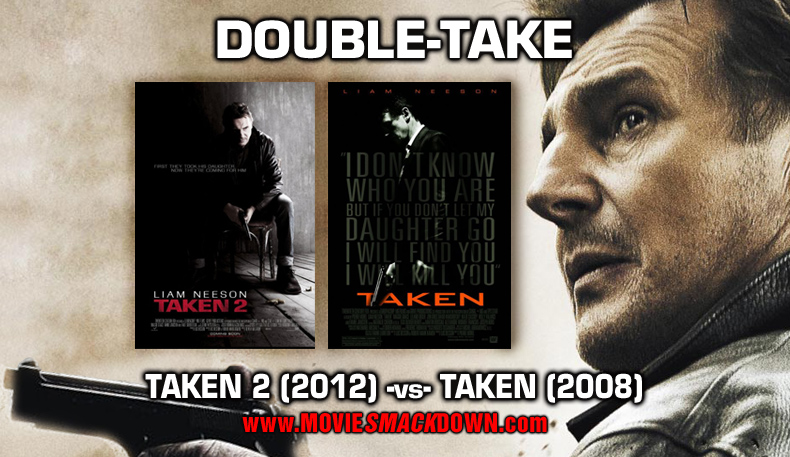
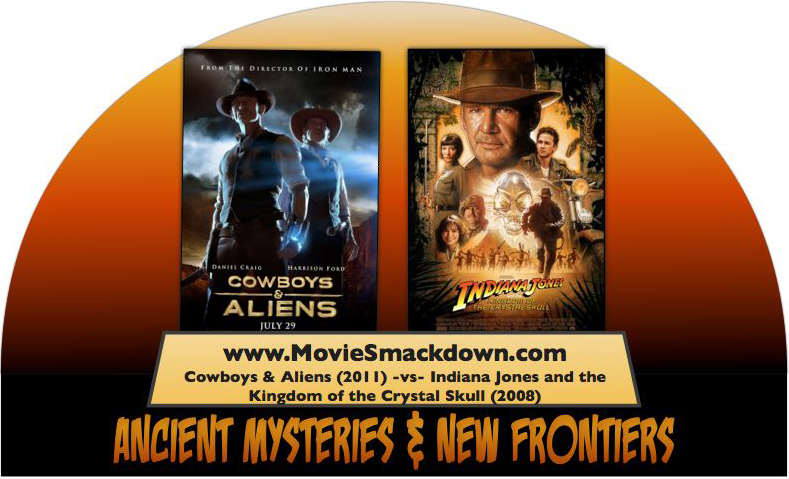

The Fugitive was, in fact, loosely based on Les Miserables. Loosely. Roy Huggins, I think, even flat out stated that Kimble was based on Valljean and Gerard, Javert. He picked the name Gerard because he thought it wounded a little bit like Javert. They both feature an ending chase in the sewers. Well, Les Mis isn’t really a chase, but you get the idea.
This review falls into the “I see what you did there” category. Very clever, and not two films I would have initially thought to compare. I would have smacked Les Mis against Moulin Rouge!, Chicago, or some other musical. I like your comparison much better.
That said, because of the sheer “apples to kumquats” nature of the comparison, I don’t think it’s fair to take the music in Les Mis out of the equation. The film is an opera, and the music is at its soul. And, yes, I know it has its detractors, but I wasn’t one of them.
While I love the action and suspense of The Fugitive, it doesn’t compare to the cinematography, the art direction, or the acting in Les Mis. One of these films is Oscar-worthy, and with all respect to Andrew Davis it wasn’t The Fugitive.
Well, you know, Kev, here at The Smack, we like a good kumquat now and again! 🙂
For me, Les Mis reaches its climax when Anne Hathaway sings, “I Dreamed a Dream.” The scene was so powerful that no other scene could top it. I spent the rest of the two hours wondering why I was still watching the film.
That’s so true, Nicole. You keep hoping it will soar up there, but it doesn’t. By the time they’re on the barricades, I was worn out.
Les Mis was Les Mehs.